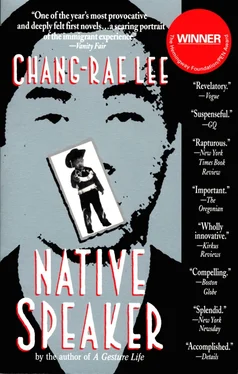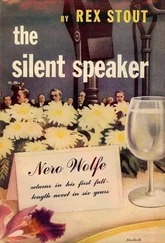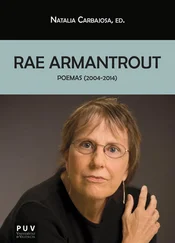He was how I imagined a Korean would be, at least one living in any renown. He would stride the daises and the stages with his voice strong and clear, unafraid to speak the language like a Puritan and like a Chinaman and like every boat person in between. I found him most moving and beautiful in those moments. And whenever I hear the strains of a different English, I will still shatter a little inside. Within every echo from a city storefront or window, I can hear the old laments of my mother and my father, and mine as a confused schoolboy, and then even the fitful mumblings of our Ahjuhma, the instant American inventions of her tongue. They speak to me, as John Kwang could always, not simply in new accents or notes but in the ancient untold music of a newcomer’s heart, sonorous with longing and hope.
We cross the bridge to the city. The streets are empty. I drive uptown on Third and then cut across to Park. I ask him exactly where we’re going on the Avenue.
He tells me the address and street, then says low, “It’s Sherrie’s. Have you ever taken me there? I can’t remember now.”
“No,” I say.
We don’t talk after that. When we get there I go inside the marbled foyer of her building and have the night doorman ring up. It’s past three in the morning. The night man is a young Chino-Latino. He regards me another moment and then says into the receiver, “He here, ma’am.” He nods and then offers me the handset.
“John?” I hear her say.
“No.”
“Who is this?”
“It’s Henry.”
“Shit.”
I tell her he’s in the car.
“Christ. Go outside then. Don’t let anyone see you. I’ll be down in a few minutes.”
When she comes she rushes from the awning in a long slicker, her head covered with the hood. They don’t kiss. They don’t touch. They sit upright and John says to go to an after-hours club on lower Broadway, near all the Korean restaurants and shops. No one will trouble us there.
Some of the clubs are known as “stand” bars, where the bartenders are all women and will have a drink with you. The women aren’t prostitutes. They won’t have sex. They’ll hold your hand and flirt and maybe even kiss you if you show enough politeness. They’ll sing popular songs and tell racy Korean jokes. Nothing pornographic or even that vulgar. This is the club pretense, the etiquette. They are ready companions, and their job is to soothe the lonely feeling of these men for a woman and a homeland. The patrons are mostly businessmen from Korea, but there are others, some whites, and then some young Korean Americans dressed in conservative suits, speaking perfect English, red-faced, drunk. Investment bankers and lawyers. This is how I come to know these places, from the last stops of several bachelor parties I went to after college. After the fancy restaurants, the serious drinking, after the tall white strippers in a suite of a midtown hotel, we would arrive here arm in arm and weary with drink, sporting an almost sorrowful obedience, not even knowing that we were searching for a familiar face pale and wide and round.
We enter a second-floor “salon” bar, basically a stand bar but one with private rooms as well. I am here because in the street John insists that all of us go upstairs. Sherrie is too tired for arguments. She just winces; obviously, they’ve been here before. They haven’t said but a few words to each other. As he shepherds us inside, I think she’s expending whatever energy she has toward an idea of John Kwang in irretrievable fall. She stares off like she’s deciding on something, promising to herself that she’ll get out while she can. But she accedes to his wishes, as do I. As long as you can, you will please the father, the most holy and fragile animal.
Our private room has two leather love seats and a smoked-glass coffee table. The walls are paneled with paper screens lighted from behind. On the table is a bottle of vodka and a bottle of scotch and lowball glasses and four cans of Sprite. John sits with Sherrie. A young woman soon enters with a tray of ornately sliced fruit and a bucket of ice. She carefully prepares the drinks, whiskey on the rocks for the men, vodka and soda for Sherrie. She bows slightly as she presents each drink, the dark eyes held down.
I can smell her perfume. It’s the kind pre-teenage girls wear, that ultrasweet, virginal scent. She is exceedingly pretty, exceedingly young. Her hair is pulled up in a French twist, and her body shows clearly through her silken dress, her breasts more like fleshy rises than mounds, her hips framed low, feet and hands of a pixie. I could crack her finger bones with a handshake, dislocate her shoulder with a stiff pull.
She picks up the tray and bows before leaving. I watch her go out. I’m tired, too, like Sherrie, and my concentration flags. It settles on sights like the girl. Her shape is easy, uncomplicated. Watching John and Sherrie work toward each other in my presence is more difficult, not for their awkwardness but for how lonely they seem.
After a few minutes the girl reappears in the doorway. She’s changed. She’s let her hair down and her new dress is loose like a slip, short, the color matte black. She looks me in the eyes. She asks John something in Korean slang, something about “being okay,” and he grunts back. The girl sits down with me. Pours herself a big drink.
John has energy. He wants to talk, but Sherrie just drinks and broods against his shoulder, slumped like a young girl in the backseat of the family wagon. We sit and drink for a while, not talking, and I watch them. I know from Janice that Sherrie’s husband is away most of the time, he’s in Tokyo right now working on bridge financing for an industrial complex in Bangladesh. Janice says he’s a looker, tall and lean and impressive, that he speaks fluent German and Japanese, and that he hasn’t slept with his wife for more than a year. I ask how she knows and she says, “Take a good look at Sherrie when someone mentions him. All dried up and dead.” I push her and she admits Sherrie told her, too.
Now I realize that Kwang has contrived that the girl is here for me.
“ Ah-ggah-shih ,” he calls her, his talking slowed, an octave lowered. Then he says, Young lady, please earn your money tonight .
She tips her brow. She takes her drink in several deep gulps and motions for me to pour more for her. I do. She touches my hand, plucks at the skin of my wrist. She can’t be any older than seventeen. She obviously speaks no English, and although my Korean is lacking I know the accents enough to know that hers isn’t educated. Her speech is unclipped and loose, full of attitude even when speaking to John in the formal constructions.
I ask her where she’s from and she answers with practice a certain fancy neighborhood in Seoul, and then offers other facts I might want to hear: she’s twenty-two, a college graduate, a good cook. I’m waiting for her to say she’s not yet an American citizen. She begins to steal closer to me, pulling her legs onto the sofa. She’s not wearing hose. She calls me Ah-juh-shih and rests her head on my shoulder. I look over and see John and Sherrie embracing.
The girl begins massaging my neck, then curls her cool fingers about my ear. John starts talking, but only in English: he is narrating what he sees, in the tone of a reporter. He tells of me, the girl. My stiffness. “The young man of integrity,” he says. “Look at the clear principle, the control. He reminds me of another Asian figure in city politics we used to know and love. Where is he now? How I wish I could recall his name. But see here, how it begins.”
The girl lifts herself and straddles one of my legs. She starts moving. She dips down and rubs herself on my knee and thigh. The pressure and length of her strokes steadily increase with his talk, which is now Korean. It sounds as if he’s berating her, but he’s telling the girl what to do. I don’t hold her back. He wants it this way. I am just flesh for this room. She holds me with a hand to the back of my neck, the other on my free leg. I’m waiting for her to kiss me, show me her tongue, slip her tiny hand between my legs. But finally she’s chaste, or, better, she treats me as if I am. This is her service to us, her honoring.
Читать дальше












